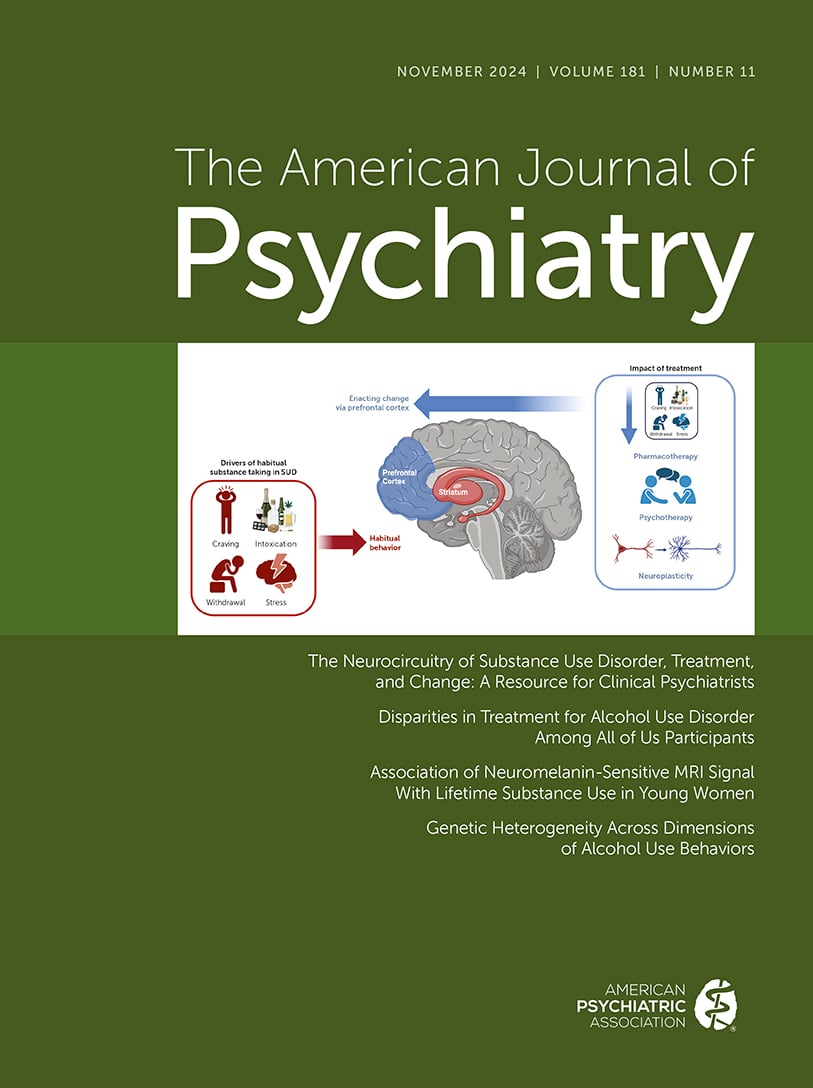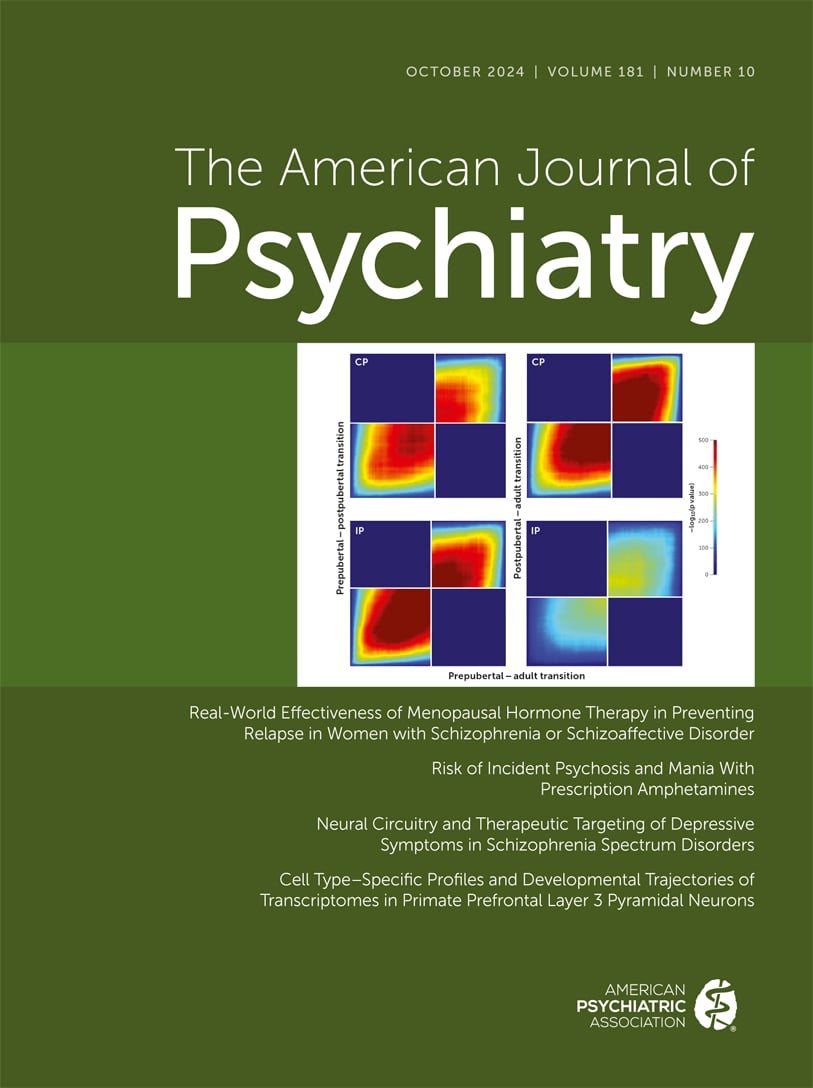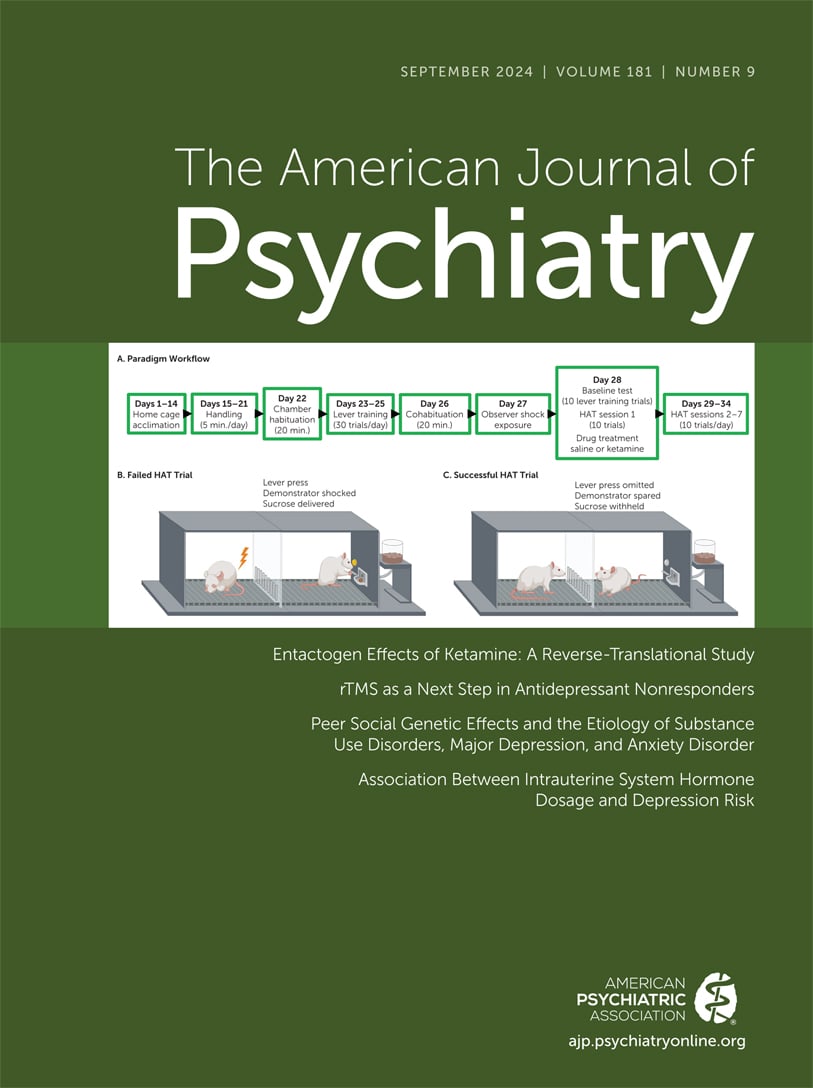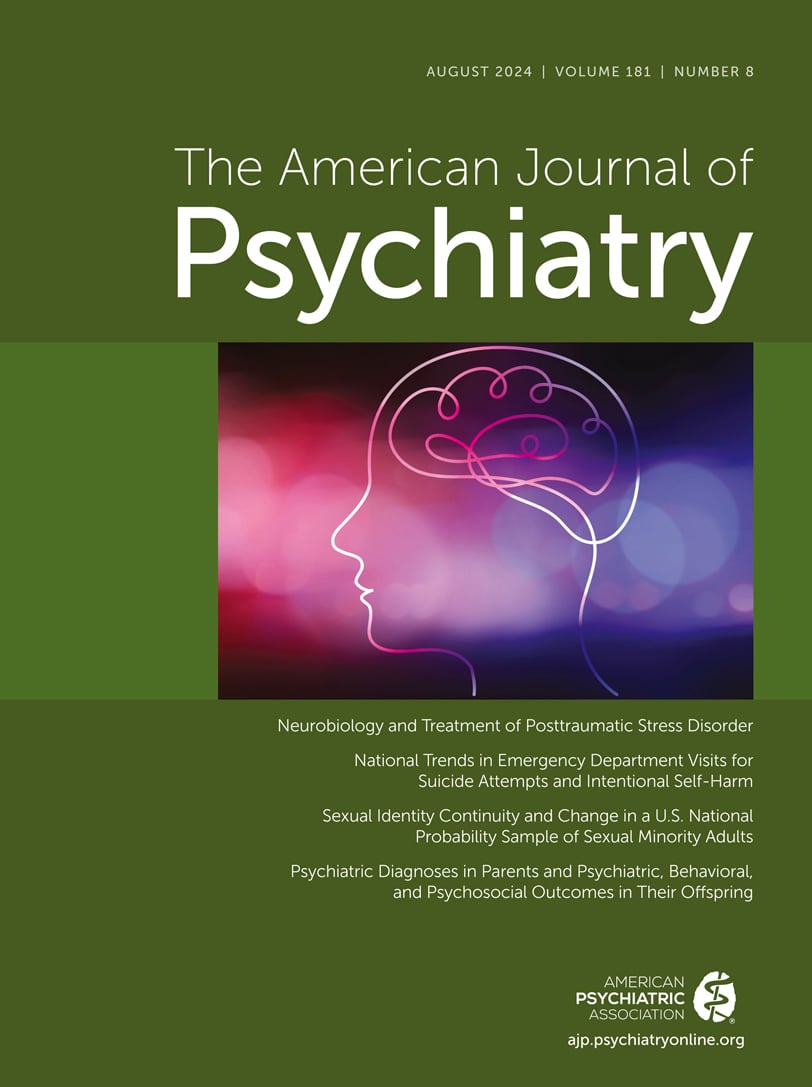American Journal of Psychiatry
- Volume 162
- Number 4
- April 2005
In This Issue
Editorial
Reviews and Overviews
Publication date: 01 April 2005
Pages648–655OBJECTIVE: The use of the terms “mind” and “brain” in psychiatry is often associated with a set of polarities. Concepts such as environment, psychosocial, and psychotherapy are linked with “mind,” while genes, biology, and medication are often associated ...
https://doi.org/10.1176/appi.ajp.162.4.648Publication date: 01 April 2005
Pages656–662OBJECTIVE: The purpose of this study was to assess the evidence base for the efficacy of light therapy in treating mood disorders. METHOD: The authors systematically searched PubMed (January 1975 to July 2003) to identify randomized, controlled trials of ...
https://doi.org/10.1176/appi.ajp.162.4.656Images in Neuroscience
Introspections
Images in Psychiatry
Article
Publication date: 01 April 2005
Pages667–675OBJECTIVE: Mild cognitive impairment has been regarded as a pre-Alzheimer condition, but some patients do not develop dementia. Given the available therapies for Alzheimer’s disease, early diagnosis is of paramount importance. The authors’ objective was ...
https://doi.org/10.1176/appi.ajp.162.4.667Publication date: 01 April 2005
Pages676–682OBJECTIVE: The only approved pharmacological approach for the symptomatic treatment of Alzheimer’s disease in Japan is the use of a cholinesterase inhibitor, donepezil hydrochloride. Recent in vivo and in vitro studies raise the possibility that ...
https://doi.org/10.1176/appi.ajp.162.4.676Publication date: 01 April 2005
Pages683–690OBJECTIVE: This investigation examined whether raloxifene, a selective estrogen receptor modulator, affects the risk for Alzheimer’s disease. METHOD: The Multiple Outcomes of Raloxifene Evaluation was a randomized, placebo-controlled trial among ...
https://doi.org/10.1176/appi.ajp.162.4.683Publication date: 01 April 2005
Pages691–698OBJECTIVE: Executive dysfunction, possibly related to vascular pathology, has been well documented in patients with a first episode of major depressive disorder in later life (late-onset geriatric major depression). However, it is unclear whether the ...
https://doi.org/10.1176/appi.ajp.162.4.691Publication date: 01 April 2005
Pages699–705OBJECTIVE: Previous studies have found associations of magnetic resonance imaging (MRI) signal hyperintensities with depression in the elderly. The present study investigates the association in a younger community sample (age 60–64 years) of depressed ...
https://doi.org/10.1176/appi.ajp.162.4.699Publication date: 01 April 2005
Pages705–710OBJECTIVE: Antidepressant use increased substantially among older adults with the introduction of the new-generation medications such as the selective serotonin reuptake inhibitors. The authors analyzed data from two follow-up intervals—1986–1987 to 1989–...
https://doi.org/10.1176/appi.ajp.162.4.705Publication date: 01 April 2005
Pages711–717OBJECTIVE: The authors examine national patterns in psychotherapy for older adults with a diagnosis of depression and analyze correlates of psychotherapy use that is consistent with Agency for Health Care Policy and Research guidelines for duration of ...
https://doi.org/10.1176/appi.ajp.162.4.711Publication date: 01 April 2005
Pages718–724OBJECTIVE: This study compared time to first remission for elderly depressed patients in primary care for practices that implemented a care management model versus those providing usual care. In addition, it sought to identify risk factors for ...
https://doi.org/10.1176/appi.ajp.162.4.718Publication date: 01 April 2005
Pages725–731Contrary to popular belief, receiving a diagnosis of a devastating fatal disease does not exacerbate, and may even alleviate, the risk of suicide. Suicidal ideation was examined in 4,171 individuals in the Huntington Study Group database. Participants ...
https://doi.org/10.1176/appi.ajp.162.4.725Publication date: 01 April 2005
Pages732–740OBJECTIVE: The course of anorexia nervosa often includes the emergence of bulimic symptoms and a crossover to the full syndrome of bulimia nervosa. However, clinicians’ ability to predict who will develop bulimia nervosa is limited. The converse ...
https://doi.org/10.1176/appi.ajp.162.4.732Publication date: 01 April 2005
Pages741–747OBJECTIVE: Few randomized, controlled trials have examined the efficacy of treatments for anorexia nervosa. Cognitive behavior therapy and interpersonal psychotherapy are effective in a related disorder, bulimia nervosa. There are theoretical and ...
https://doi.org/10.1176/appi.ajp.162.4.741Publication date: 01 April 2005
Pages748–752OBJECTIVE: Although anorexia nervosa was once thought to occur only in affluent societies, cases have now been documented across the globe. To examine whether anorexia nervosa emerges in societies undergoing socioeconomic transition, the authors studied ...
https://doi.org/10.1176/appi.ajp.162.4.748Publication date: 01 April 2005
Pages753–757OBJECTIVE: Most previous studies of mortality in anorexia nervosa patients have shown an increased risk of premature death but have been limited by methodological constraints. This study aimed to overcome some of these constraints by having a large ...
https://doi.org/10.1176/appi.ajp.162.4.753Publication date: 01 April 2005
Pages758–766OBJECTIVE: Schizophrenia is generally considered to be a neurodevelopmental disorder reflected in findings of neuropsychological impairments and neurological abnormality in patients and their relatives. The authors investigated whether neuropsychological ...
https://doi.org/10.1176/appi.ajp.162.4.758Publication date: 01 April 2005
Pages767–773OBJECTIVE: The authors examined the relationship between maternal antibody to toxoplasmosis and the risk of schizophrenia and other schizophrenia spectrum disorders in offspring. Toxoplasmosis is known to adversely affect fetal brain development. METHOD: ...
https://doi.org/10.1176/appi.ajp.162.4.767Publication date: 01 April 2005
Pages774–780OBJECTIVE: Reports of increased rates of psychosis in prisons could be due to sampling and ascertainment differences. The authors compared two samples of subjects 16–64 years of age: those from the general population of residents in Great Britain and ...
https://doi.org/10.1176/appi.ajp.162.4.774Publication date: 01 April 2005
Pages781–787OBJECTIVE: The inability to blind research participants to their experimental conditions is the Achilles’ heel of mental health services research. When one experimental condition receives more disappointed participants, or more satisfied participants, ...
https://doi.org/10.1176/appi.ajp.162.4.781Brief Report
Publication date: 01 April 2005
Pages788–790OBJECTIVE: The inability to taste phenylthiocarbamide (PTC) has been associated with medical and neurological illnesses not typically related to taste. The authors examined PTC sensitivity in schizophrenia patients and their non-ill relatives to determine ...
https://doi.org/10.1176/appi.ajp.162.4.788Publication date: 01 April 2005
Pages790–792OBJECTIVE: The authors’ goal was to investigate the distribution of metabolites and voxel composition in the pons and three cerebellar subregions and compare metabolite integral values and differences in voxel composition between patients with ...
https://doi.org/10.1176/appi.ajp.162.4.790Publication date: 01 April 2005
Pages793–795OBJECTIVE: This study longitudinally assessed previously validated dimensions of thought disorder—verbal underproductivity and disconnection—in geriatric schizophrenia and replicated previous cross-sectional differences in communication disorders. METHOD: ...
https://doi.org/10.1176/appi.ajp.162.4.793Publication date: 01 April 2005
Pages796–798OBJECTIVE: The authors’ goal was to determine if prescription of antidepressant medication plus olanzapine initiates a more rapid response than prescription of antidepressant alone. METHOD: Twenty patients with major depression were studied. For 2 weeks ...
https://doi.org/10.1176/appi.ajp.162.4.796Publication date: 01 April 2005
Pages799–802OBJECTIVE: The authors’ goal was to investigate whether there is a greater suicide risk in the placebo arms of placebo-controlled studies of active medication for the treatment of acute manic episode and the prevention of manic/depressive episode. If so, ...
https://doi.org/10.1176/appi.ajp.162.4.799Publication date: 01 April 2005
Pages802–804OBJECTIVE: The authors examined platelet serotonin reuptake inhibition and response to selective serotonin reuptake inhibitor (SSRI) treatment in depressed adolescents. METHOD: Twenty-three depressed adolescents participating in pharmacokinetic studies of ...
https://doi.org/10.1176/appi.ajp.162.4.802Publication date: 01 April 2005
Pages805–807OBJECTIVE: Data suggest the involvement of serotonergic and neurotrophic systems in major depressive disorder. To investigate their potential interaction, the authors studied changes in serum levels of brain-derived neurotrophic factor (BDNF) during ...
https://doi.org/10.1176/appi.ajp.162.4.805Publication date: 01 April 2005
Pages807–809OBJECTIVE: Neuroticism is a predisposing factor for major depression. The increase in salivary cortisol that follows waking provides a reliable measure of adrenocortical activity, and this response is increased in recovered depressed patients. This study ...
https://doi.org/10.1176/appi.ajp.162.4.807Letter to the Editor
Book Forum: Ethics, Values, and Religion
Book Forum: Psychoanalysis
Book Forum: Psychopathology
Book Forum: Mental Health Services
Correction
Past Issues
View Issues Archive
Vol. 181 | No. 11

Vol. 181 | No. 10

Vol. 181 | No. 9
